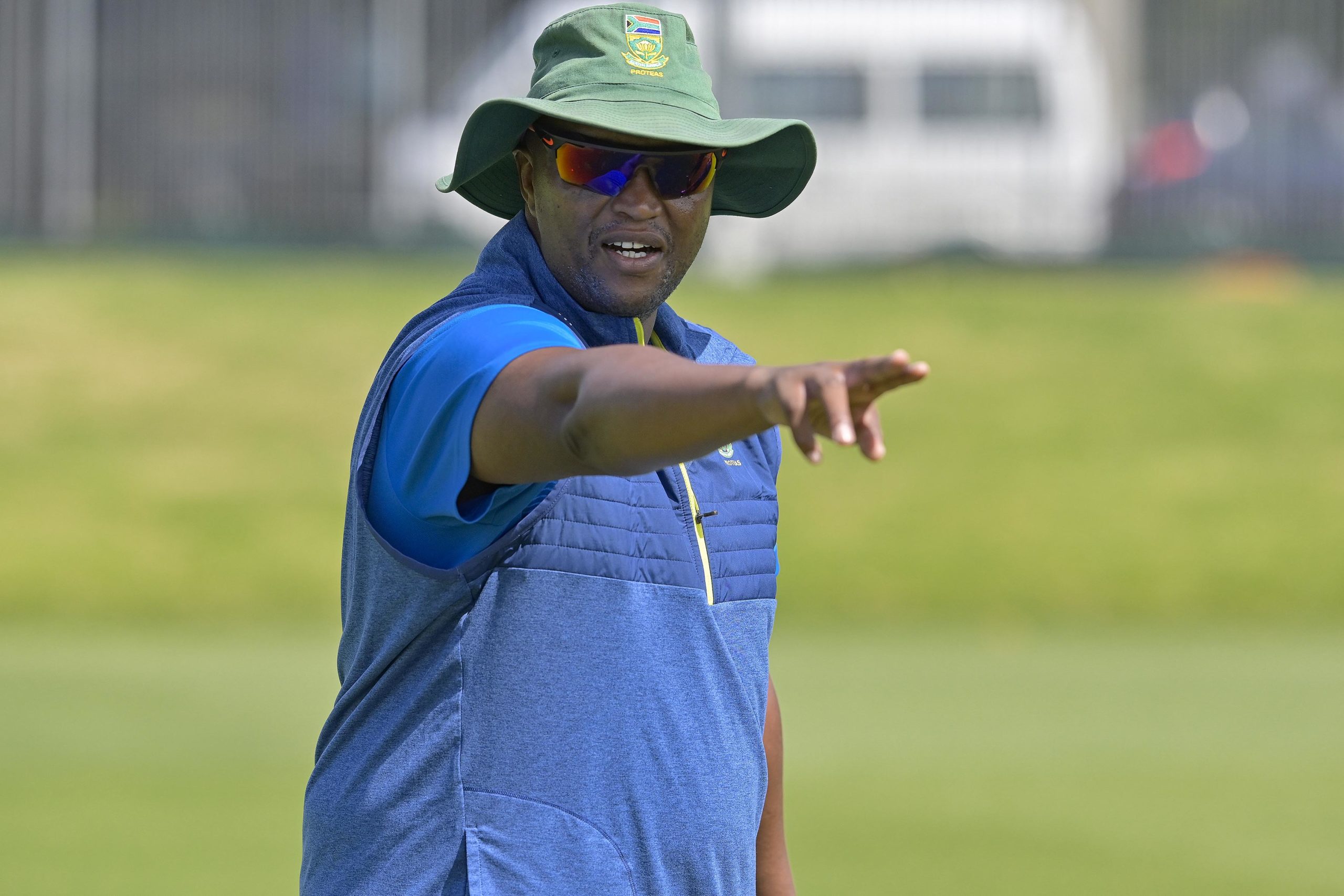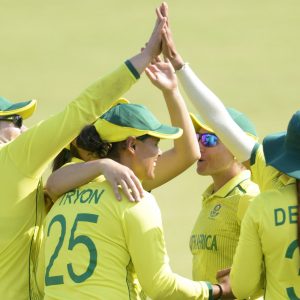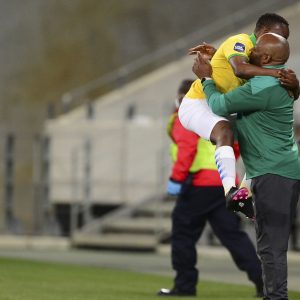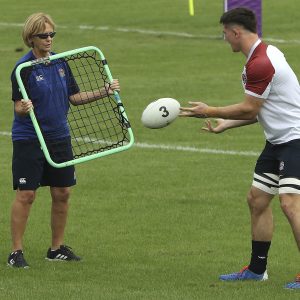Undeterred Hilton Moreeng focuses on World Cup 2022
The coach of the Proteas Women has built the national team almost from scratch, taking them to the semifinals in two cricket World Cups. Getting to the final is next on their list of goals.
Author:
14 August 2021

Few things scream passive aggression more than demands from upper management that certain staff members reapply for their jobs.
It’s become the way of the corporate world. But being asked to motivate why you should keep the job in which you have laboured under the misapprehension that it was yours can be perplexing. Is the point to weed you out? Or is it one of those “nothing like a hanging in the morning to focus the mind” games that bosses play?
Cricket South Africa (CSA) thrust head coach Hilton Moreeng into this position last year, after eight years of overseeing the Proteas Women go from practically a scratch team to semifinalists the last time one-day international (ODI) and Twenty20 (T20) World Cups were held.
Related article:
Water-cooler talk at CSA was that the national governing body was looking for new blood to take the team forward. This was a betrayal of the sporting fraternity’s belief in him after the 43-year-old took the team to the 2017 ODI World Cup semifinal, where they lost to England by two wickets, and the semifinal against Australia in the T20 global showpiece, where they missed out by five runs, three years later.
Looking at the “team” Moreeng inherited in 2012, it’s the kind of thank you that brings the words “slap” and “face” to mind. But if he feels resentful about the lack of gratitude for building a bakery from crumbs, Moreeng’s keeping it to himself.
Two types of coaches
“As a coach, you know that it’s a very volatile profession,” he begins pragmatically. “You know that one day, it’s going to come to a day when the system’s had enough and it says, ‘That’s you [done].’ The end is going to come, but it’s not something you can control.
“The moment you start coaching you’re always told there are two types of coaches, those who have been fired and those who are about to be fired. So while you’re in this space make the best of it, because one day it’ll come to a point where you have to go.”
Whatever his true feelings, Moreeng’s response on the field was as professional as it was emphatic. In their next two series, the Proteas beat Pakistan with a combined ODI and T20 tally of 5-1 at home and scored an astonishing 6-2 playing away against India.
Talk about making the best of things.
Related article:
Moreeng has been almost a lone ray of sunshine in South African cricket in the past year or so, as it has lurched from one crisis to the next. And the irony of these performances is that they may well have provided some of the missing parts of the Proteas Women puzzle that his bosses were fretting about.
Their result against India was achieved without regulars Dané van Niekerk, Chloe Tryon and Masabata Klaas, paving the way for Lara Goodall, Anneke Bosch and Laura Wolvaardt – as captain – to step up.
“The nucleus of a team is always tested by how the youngsters perform, because they’re the ones who put pressure on the seniors,” says Moreeng. “When you work with players, you know that they’re not always going to get on the field and perform immediately.
“A player like Lara Goodall is starting to show what people haven’t seen yet. Anneke Bosch has been working extremely hard. But they never could put performances together for the world to see when given opportunities.”
Lack of consistency
By Moreeng’s estimation, two things have traditionally stood in his team’s way of world domination. “The missing ingredient for us has always been our consistency as a team, because there are days when we play extremely good cricket and there are days when we just don’t pitch up.
“So the challenge we had as a team was that between our best day and our worst game there was no in-between, where you could play bad cricket but still win the game. So you could see it when we played against Pakistan that we [now] had that, and the consistency was much better against India.
“As soon as the consistency kicked in, the result was a 4-1 series win. But back then it would have been 3-2, or we might even have lost the series… We have capable players, it’s just that they’re not consistent. Once we get that right, the team will reach the heights expected of them.”
Related article:
These heights are the Proteas making their first major championship final and then winning it. They are unimaginable goals from those he was restricted to setting at the start of his tenure.
With only a handful of staff, coaching was very much an all-hands-on-deck affair as everyone had to muck in regardless of their official role. Eleven-hour working days were typical.
Humble beginnings
“In the beginning it was tough,” he says. “[Team] management was just a coach, an analyst, a manager and a fitness trainer. So we didn’t have that coaching capacity or resources … It’s only now that we have them and the more hands we have for the players to perfect their skills, the better.
“The High Performance Centre, through the leadership of Vincent Barnes, has been very helpful to us whenever we’ve needed help, by getting us whoever we needed. But back then it was tough, I won’t lie to you, you had to graft.”
While nominally another ex-player coach, Moreeng’s grounding in coaching goes deeper than his counterparts. It has prepared him for the hard slog of being the man in charge of putting women’s cricket on the domestic and international map.

Kimberley-born and raised, Moreeng can be said to have begun his coaching career the first time he picked up a bat as a six-year-old and, not long after that, started playing for the Yorkshire Cricket Club.
He made the then Griqualand West Nuffield Week team, earned himself a place at Knights Cricket Academy and went on to play for the Free State. But there was always a sense of all roads leading to coaching, because even as he scaled the ladder he always found time to coach.
“I was always helping out with the juniors at the club [Yorkshire CC] and when I came to the Free State, I used to help out at the School of Excellence while I was studying [sports science] and playing, just to make an extra buck here and there.”
Related article:
His numbers didn’t make great reading for a first-class career though and this was the catalyst for the wicketkeeper-batsman becoming a full-time coach at the age of 23. “I was in the squad since age 19 but mainly playing in the B-team, and when my breakthrough came at about 21, 22, it was so difficult to get into the team.
“So I had to make a decision … I think I played four games and after those four games, things just didn’t work out [he averaged 4.85 and 9.50 in first-class and List A cricket, respectively] and I felt I had to stop and go back to coaching because I didn’t see myself as someone who would play for the country one day.
“We had a young squad back then, so you had to wait your turn in the team because opportunities didn’t come as often. Black tax also comes in and you have other responsibilities to look at because you’re done studying. A decision had to be made and I decided I had to go work.”
The importance of enjoyment
Moreeng began his coaching at the very bottom with mini cricket and the only level he hasn’t coached at in South Africa is franchise. But what really prepared him to coach women’s cricket was coaching blind and deaf cricket.
“Monday to Friday I would coach, and then Saturday and Sunday I’d play club cricket,” he says. “But then disabled cricket, which was on weekends, came in, so I ended up working seven days a week.
Related article:
“Coaching blind and deaf cricket was humbling because you’re dealing with athletes who have daily challenges in life that you don’t have, so you start to appreciate what you have. And they always had a smile, looking forward to the session, and afterwards they’d come and thank you and couldn’t wait for the next one.
“It was important to make it more enjoyable because they were looking forward to it, and for some of them that was the only opportunity they had to interact with people. So, you had to make sure the few hours you had with them was something they’d remember.
“It’s a reminder that the world owes you nothing.”
Opportunities for women
For all his solid foundations in coaching out of the ordinary, women’s cricket was a challenge. “The difficulty then for us, as young coaches who were a group of guys, was we were dealing with athletes who hadn’t been exposed to basics and decided at age 15, 16 or 18 they wanted to play cricket.
“We’d taken the foundation the boys had from mini cricket and age-group cricket for granted, but with the women’s game we realised it wasn’t there. Throughout the sessions, you had to go back to address those issues, which took as much as three years sometimes.”
Even trickier has been the recruitment of players, owing to the lack of visibility and cultural limitations that still prevail over young women wanting to play the game. “If your daughter plays soccer, you know there’s a future or a pipeline. In cricket, parents ask, ‘Why are you playing cricket?’ because they don’t see the national team play. So, the youngsters come for a few weeks and vanish.

“The other challenge you have is the responsibilities – and here I’m talking about the Black girls – they have at home, when they come to a certain age where they’re expected to do domestic chores, cooking and looking after siblings.
“You still see it today, and hopefully the more the Proteas Women do well, parents can see why these girls are going to a cricket ground to practise. There are opportunities and they can make a living out of the game. It’s not just playing, they can be umpires, administrators… not a lot of people know that.”
When he says liking working with people and helping them is what drew him to coaching, Moreeng sounds like every other coach. Until you find out that when CSA commissioned a sports psychologist to encourage the team to unburden themselves, so many of the players and management staff said they’d already told Moreeng their problems that the psychologist wondered out loud who the coach had turned to with that heavy burden, let alone his own issues.
Moreeng is so dedicated that Goodall dedicated her Player of the Match award in India to him and the work he’d done and belief he’d shown in her behind the scenes. And the youngest of his two boys (he keeps his family out of interviews) thinks he works at the airport, because they and his wife are always dropping him off there.
Gathering knowledge
Like all self-respecting coaches, Moreeng is as much about empathy as he is about attention to detail. With more and more of his players doing well enough to be invited to play in T20 leagues around the world, they found their coach waiting to interrogate them about what they’d learnt on their return.
“When the first group went to [Australian T20 league] Big Bash, I think we only had two or three players,” says Moreeng. “When they came back, we sat in a room because we were trying to see where we are as a group, whether there was something they were doing differently over there, if we were missing anything…
“They all said we could do more here, sharpen up there, and we looked at all those things. Now we’ve gone from two players to nine, and possibly 11 players. And when those players come back, you could see how their level has raised, how aware they are as cricketers and how they manage themselves and their bodies.”
Related article:
Moreeng famously employed a consultant to make sure all his batters, particularly in the lower order, had an idea of how to face spin bowlers as an extra “20 or 30” runs could be make-or-break for the team. And from a system perspective, contracting national team players and being able to play top nations such as England and Australia on a regular basis have been game-changing.
Having been told to reapply for his job once before, Moreeng is aware that his time with his team may be limited. “Our plan was always to get into the final of the next World Cup [2022] and hopefully win it. When we had to reapply for the job, we looked at the fact that we still hadn’t achieved our goal. So, that’s why we applied again.”
Here’s hoping the unfinished business theme holds.






